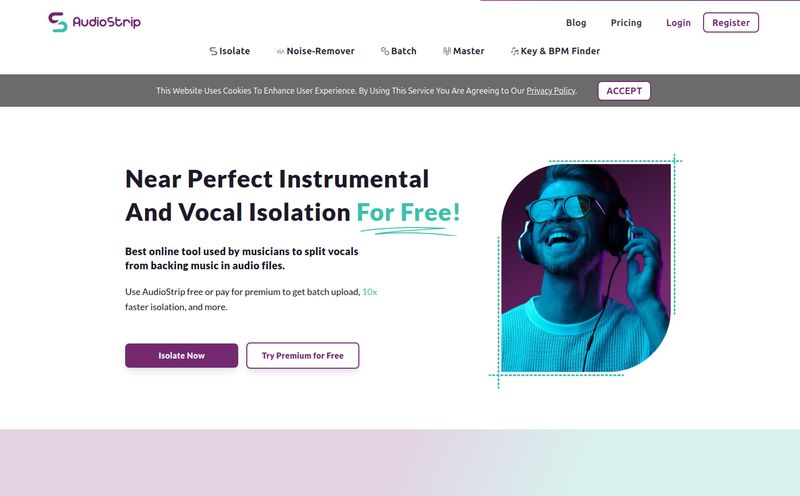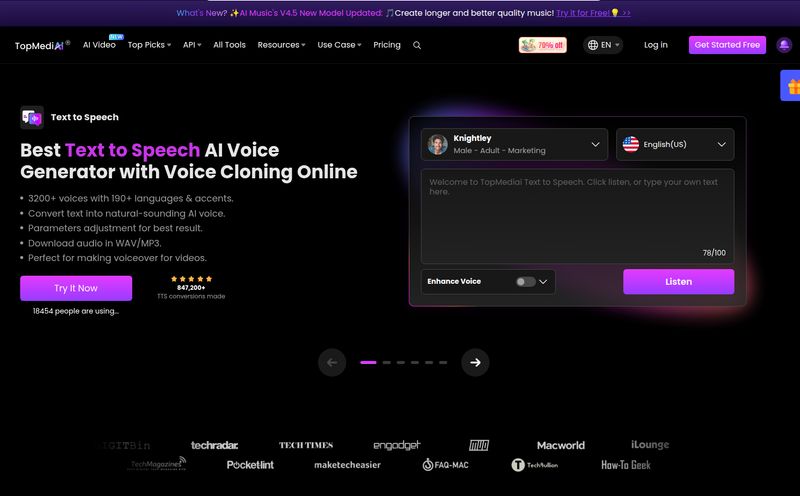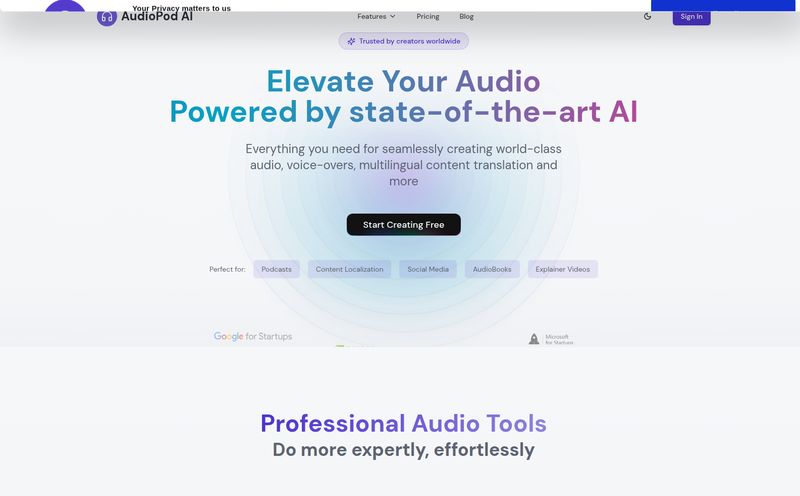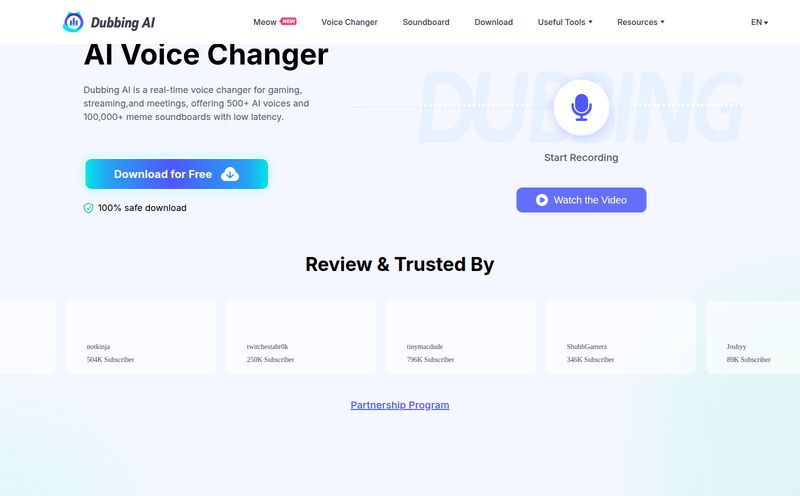I have a distinct memory from about fifteen years ago. I was trying to learn the bass line to 'Hysteria' by Muse. You know the one. That relentless, driving, melodic masterpiece. I had my bass, a cheap practice amp, and Windows Media Player open, hitting the back button every 3 seconds, trying to decipher the notes through a wall of distorted guitars and drums. It was… frustrating. I probably spent a solid week just figuring out the first 8 bars. If only I’d had a time machine.
Or, as it turns out, if only I’d had SplitSong.
The whole landscape of music production and even just music appreciation has been turned on its head by AI. We've seen AI art generators, AI writers, and now, we're getting these incredible AI-powered audio tools that can do things we used to think were impossible, or at least, required a team of audio engineers in a million-dollar studio. SplitSong is one of these tools, and frankly, it feels a little bit like magic.
What on Earth is SplitSong, Anyway?
Let's get the technical stuff out of the way. SplitSong is a web-based tool that uses artificial intelligence to deconstruct a song. You give it a finished track, and it gives you back the individual parts—what we in the biz call 'stems.' Think of it like giving a chef a fully-baked cake and asking them to return the flour, eggs, and sugar to you in separate bowls. It’s a wild concept.
You can either upload an audio file directly or—and this is my favorite part—just paste in a YouTube link. The AI whirs away for a moment and then presents you with isolated tracks: typically vocals, bass, drums, and a general 'instrumental' track that contains everything else like guitars, synths, and pianos. It’s designed for pretty much anyone who loves music, from producers looking for a clean acapella to remix, to musicians wanting a backing track to jam with, or even just curious fans who want to hear what their favorite singer really sounds like without all the noise.
Putting It Through Its Paces: The Michael Jackson Test
A tool can talk a big game, but the proof is in the pudding. Or in this case, the isolated tracks of a pop music icon. The example right on their homepage is Michael Jackson's 'Thriller'. A perfect choice. It's a complex, layered production that every person on earth has heard a million times. If the separation is bad, you'll know immediately.
So, I hit play.
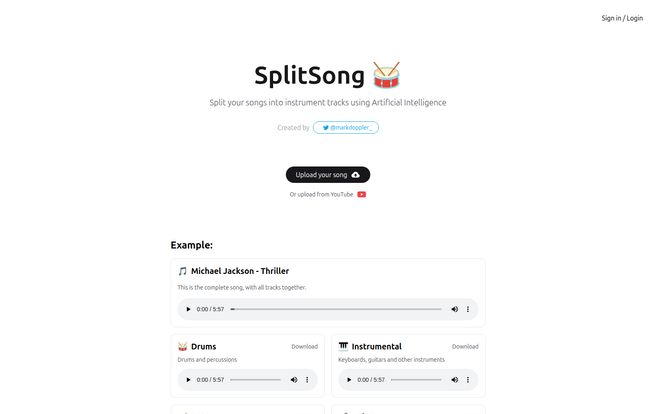
Visit SplitSong
First, the full track. Yep, sounds like 'Thriller'. Then I clicked on the isolated 'Voice' track. And there it was. Michael's lead vocal, the backing harmonies, even Vincent Price's iconic laugh, all clear as day. Was it 100% perfect studio quality? No. There's a tiny bit of what we call 'artifacting'—a slight watery sound where the AI had to work really hard to surgically remove the instruments. But for a free tool on a website? I was floored. It was more than usable; it was impressive.
The bass line was next. Solid. The drums? Crisp. The 'Instrumental' track was a beautiful wash of funky guitars and spooky synths. It felt like I was sitting at the original mixing desk, soloing tracks. For a music nerd like me, that’s an incredible feeling.
The Good, The Quirky, and The AI
After playing around with a few more songs (from classic rock to modern electronic), I got a pretty good feel for SplitSong’s personality. It definitely has one.
What I Absolutely Love
The first thing is the sheer, unadulterated simplicity of it all. There’s no software to download, no confusing knobs or dials. The user interface is clean to the point of being minimalist. It's built for speed. That YouTube link integration is the killer feature. I can't overstate how much of a game-changer that is. It removes a whole, legally-grey step of needing to find and download an MP3 of a song you want to mess with. You think of a song, you find it on YouTube, you paste the link. Done. Its almost too easy.
Where It Gets a Little Fuzzy
Now, let's be real. This AI is not a god. The quality of the separation can be a bit of a mixed bag, and it really depends on the source material. A simple, well-mixed pop song with a clear vocal in the center? It'll tear that apart beautifully. But throw a chaotic, heavily-distorted metal track or a washy, reverb-drenched shoegaze song at it, and the AI can get a little confused. You might get some guitar bleed in the vocal track or have the cymbals sound a bit 'phasey'. This isn't really a knock on SplitSong specifically, but more a reality of where this technology is at right now. Also, it looks like you might need to sign in or create an account to use it, which is a small hoop to jump through, but a hoop nonetheless.
The Million-Dollar Question: What's the Price?
Here’s where things get interesting. I went looking for a pricing page, a 'Pro' plan, anything. And… I found a 404 error. The page couldn't be found. Now, this could mean a few things. It might be that the tool is entirely free for now, perhaps as part of a public beta to train the AI. It could be that the pricing page is just temporarily down. My gut tells me they'll likely introduce a tiered model eventually, maybe with higher quality exports or more stems for a subscription fee. For now, though? It appears to be free to use, which is just insane value.
Creative Ideas to Get You Started
So you have this powerful tool at your fingertips. What can you actually do with it? Oh, let me count the ways.
- Producers and DJs: This is the most obvious one. You can finally get that clean acapella for your next bootleg remix. Want to sample that funky bassline from a 70s disco track? Isolate it, chop it, and drop it in your DAW. It’s a sampler’s paradise.
- Musicians Learning Songs: My 15-year-old self would weep with joy. Isolate the guitar part, slow it down with another tool, and learn it note-for-note. Create your own personal backing tracks from any song to practice solos over. The possibilities are endless.
- Content Creators: Need background music for your podcast or YouTube video? Grab an instrumental version of a track so it doesn't clash with your voiceover. (A huge, flashing-neon-sign of a disclaimer here: copyright is real! Using separated stems doesn't magically make them royalty-free. Always be mindful of the law and use these for personal projects or with proper clearance.)
- Karaoke Champions: This is your secret weapon. Find any song, strip the vocals, and you have a custom karaoke track. No more searching for dodgy MIDI versions of your favorite song.
How Does SplitSong Stack Up?
SplitSong isn't the only player in the AI music separation game. There are other fantastic services out there, like Lalal.ai and Moises, which often offer more granular control, like separating guitars from pianos, for a monthly fee. I'd say SplitSong's main advantage is its hyper-focused simplicity and that brilliant YouTube integration. It's the quickest tool from 'I have an idea' to 'I have the stems.' For professionals who need the absolute highest fidelity and more separation options, a paid service might be the better choice. But for quick jobs, experimentation, and general music geekery, SplitSong is an absolute winner.
Final Thoughts on This Piece of AI Magic
Tools like SplitSong represent a fundamental shift in how we interact with music. They democratize the art of the remix and make learning music more accessible than ever before. It's a bridge between the passive listener and the active creator. While not perfect, it’s a powerful, fun, and genuinely useful tool that I've already bookmarked. It opens up a world of creative possibilities that, just a few years ago, were simply out of reach for the average person. So go on, find that song you've always wanted to dissect, and let the AI do the surgery. You might be surprised by what you find inside.
Frequently Asked Questions about SplitSong
What is SplitSong?
SplitSong is a free online tool that uses Artificial Intelligence (AI) to separate a song into its core components. You can upload an audio file or paste a YouTube link, and it will give you separate downloadable tracks for vocals, bass, drums, and other instruments.
How does SplitSong's AI separation work?
It uses a trained AI model that has learned to recognize the distinct frequency patterns and characteristics of different instruments and human voices. The AI analyzes the full song and digitally isolates these elements into separate audio streams, or 'stems'.
Is SplitSong completely free to use?
As of late 2023, the tool appears to be completely free. There is no visible pricing information or subscription plan on their website, though this could potentially change in the future.
Can I legally use the separated tracks in my own music?
This is a big one: No. Separating a copyrighted song does not grant you the rights to use its parts. The original song is still protected by copyright. Using the isolated vocals or instrumentals in your own commercial releases without explicit permission (a 'sample clearance') from the copyright holders (usually the publisher and the record label) is illegal and can lead to serious legal trouble. For personal use, practice, and private remixes, it's generally fine.
How accurate is the vocal and instrument separation?
The accuracy is surprisingly good for an automated tool, but not always perfect. It works best on songs with clear production and a standard song structure. On very dense or experimental tracks, you might hear some 'bleeding' or artifacts where the AI struggled to make a clean separation. It's fantastic for practice and quick remixes, but may not meet the standards for a high-end professional production without some cleanup.
Reference and Sources
- SplitSong Official Website: https://splitsong.com/
- Moises.ai (Competitor): https://moises.ai/
- Lalal.ai (Competitor): https://www.lalal.ai/
